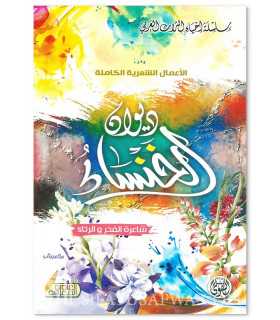
Diwan al-Mutanabbi - The complete works

The Poetry of pre and post Islamic era and the...

Diwan Hasan ibn Thabit al-Ansari

Dictionaries of Quotations of Arabic Poetry...

Diwan Abu Nawas, selection of poems by Abu Nuwas

Al-Khansa was the most famous 7th century Arabic poet and the best known female poet in Arabic literature. She spent the greatest part of her lifetime during the pre-Islamic days, and when Islam prevailed, she embraced it and went to see the Messenger of Allah, peace and blessings of Allah be upon him, as a member of the delegate of her tribe, Banu Sulaym. The Prophet, peace and blessings of Allah be upon him, used to ask her to recite her poetry to his admiration. Her full name is Tumadir bint ʿAmru Ibn al-Ḥarith Ibn al-Sharid al-Sulamiyyah, from the tribe of Banu Sulaym, from Qays Aylan, from Mudhar, from Najd.
Most and finest of her poems were about her brothers Sakhr and Mu’awiyyah, killed in the pre-Islamic era. She mourned their death in poetry and gained fame for her elegiac compositions. Her Diwan (poetry collection) contains what had been memorized of her poetry.
Al-Khansa’ had four sons, all of whom converted to Islam and were all killed in the Battle of al-Qadisiyyah in 16 AH. When she received the news, she did not grieve, but said, “Praise be to Allah who honoured me with their martyrdom. And I have hope from my Lord that He will reunite me with them in the abode of His Mercy.”
Data sheet




Please sign in first.
Sign inCreate a free account to use wishlists.
Sign in